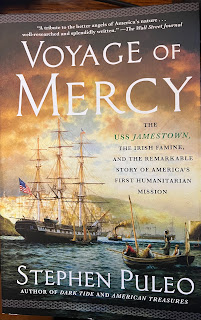"Voyage of Mercy" by Stephen Puleo
313 pages; Published by St. Martin's Griffin, ©2020
"Potato Famine" is a term synonymous with Ireland and her history. What many people outside of the Emerald Isle may not realize, however, is that there have been multiple outbreaks that have affected the Irish's most famous crop, and it has led to extreme hunger, grinding poverty, disease, and ultimately, thousands of people leaving their homeland in search of a better life.
The events throughout Ireland and the actions it spurred on the other side of the Atlantic Ocean are told in Stephen Puleo's "Voyage of Mercy". The book covers events from 1846-1850, including the period known as "Black '47", when the effects of the famine began to take hold, and the courses of action decided upon by American lawmakers and philanthropists.
People across the United States are familiar with calls to aid after a disaster at home or abroad. These calls on the internet and through the media are taken for granted these days, but a call for help didn't always follow the calamities and disasters until February, 1847, when a Boston merchant named Robert Bennet Forbes attended a meeting at Faneuil Hall where Bostonians met to discuss what could be done for the starving Irish. Attention was brought to the matter by Father Theobald Mathew, a Catholic priest whose letters to America illustrated the daily struggles of the ragged, starving people who had depended on the potato for so long for sustenance and nourishment.
Moved by the speeches that night at Faneuil Hall, Forbes volunteers to take the first of many cargoes of food to the struggling Irish. He knows doing so will leave his wife, Rose, alone with her children. Robert has left his family before, but never on a humanitarian mission. It is a mission that carries all of the inherent risks of sailing at sea but carries no monetary profit for the sailing merchant.
During his time abroad, Robert hopes his wife and their marriage will survive while he is away. Rose is somewhat fragile due to losing four young children. Robert's uncertainties are somewhat allayed by the cheering throngs of people at the port of Cork Ireland. The good feelings throughout the city, however, are tempered by internal bickering by Irish municipal officials who debate how to divide the food. The red tape started earlier in the book as American officials debated whether it was acceptable to use the U.S.S. Jamestown, a warship, for a humanitarian mission. While this is going on, Americans and Irish alike are wondering why the British Parliament, Ireland's governing body, is taking so long to help its citizens.
"Voyage of Mercy" recounts the Irish Potato Famine through Irish, British, and American Perspectives and chronicles the mission of Forbes, the first in a long line of humanitarian missions Americans have made to alleviate suffering. Before Forbes set sail on the Jamestown, no one had ever considered private citizens offering aid to anyone, let alone in a foreign country. Puleo also tries to offer a view through Britain's red tape and find answers to a question first asked in the middle of the 19th century: Why doesn't Britain help her people?
It would also be remiss to not mention Father Mathew, who risked his own life to minister to the starving, diseased, and lice-ridden Irish peasants. Father Mathew's care for people in his parish and beyond may not have provided much in the way of physical help, but his efforts certainly bolstered many spirits, and are also worth reading about in this book.
Puleo gives a deeper look at a well-known chapter of Irish history and takes a look at the efforts of the city of Boston and the beginning of its renowned Irish pride and heritage. He puts names and faces with a broad historical chapter that is often cited but may not be necessarily well-known. The illustrations made in "Voyage" will make you wonder how anyone in Ireland survived such an ordeal, and make Irish, and all Bostonians, proud.




Comments
Post a Comment